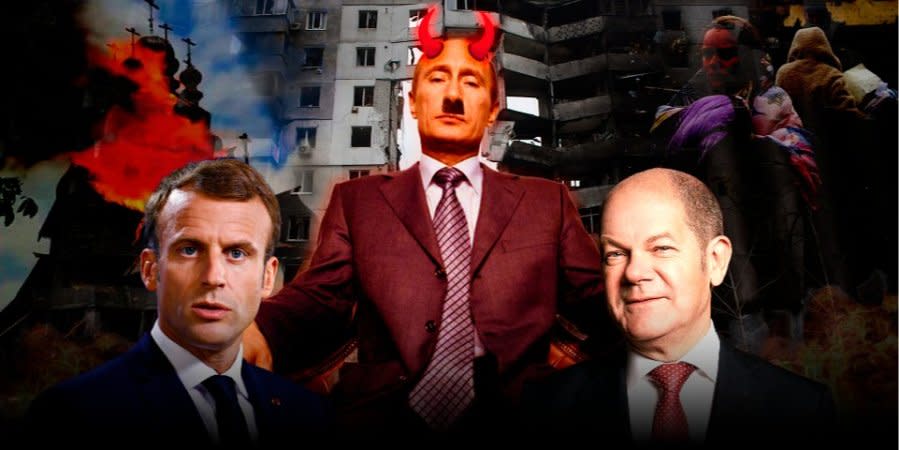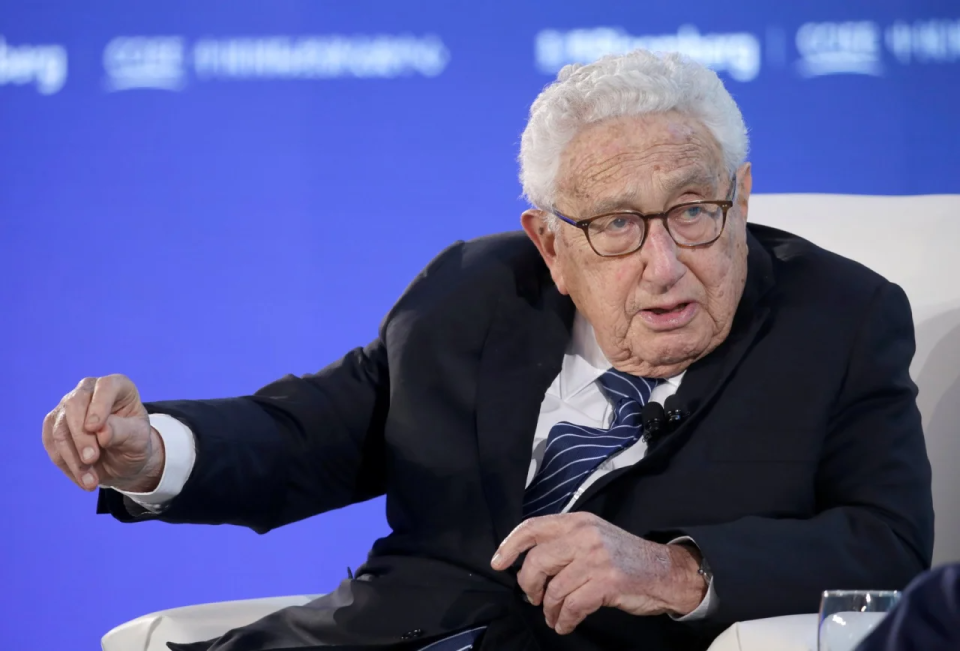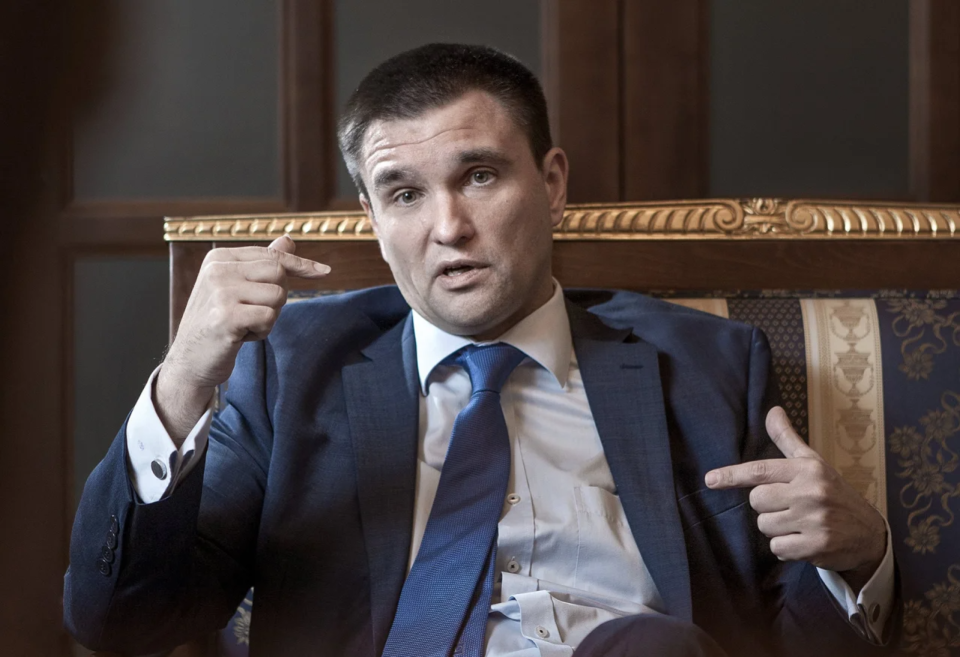Why are European leaders so eager to help Putin save face?

- Oops!Something went wrong.Please try again later.
- Oops!Something went wrong.Please try again later.
- Oops!Something went wrong.Please try again later.
- Oops!Something went wrong.Please try again later.
“Some Western politicians and media are starting to prod Ukraine towards ending the war on unfavorable conditions for us,” Ukrainian President Volodymyr Zelensky said recently. According to him, the suggestions involve Ukraine ceding some land to Russia in order to get Russian dictator Vladimir Putin to “back off.”
Western Europe has always been extremely wary of a potential Third World War, or at least severe economic fallout from a conflict with Russia. That’s why those countries are so keen on appeasing Putin. In recent weeks, however, this push for a quick peace with Moscow has picked up pace.
This week, the President’s Office had to engage in a public debate with former German Chancellor Angela Merkel, who refused to admit that Berlin’s Russian policy had been wrong.
Read also: Macron calls for ‘not humiliating’ Russia, speaks of ‘isolated’ Putin
Merkel insists that refusing to admit Ukraine into NATO was the right thing to do in 2008. Similarly, she doesn’t feel responsible for Germany’s approach to Russia consistently emboldening Putin to become ever more aggressive.
“I wasn’t naïve” about Moscow’s intentions, said Merkel.
But why then would Germany fight so hard to increase its dependence on Russian energy by championing the Nord Stream-2 natural gas pipeline? That’s the crucial question raised by Ukrainian presidential adviser Mykhailo Podolyak in response to Merkel’s recent interview.
The current German government also is rather ambivalent – according to Der Spiegel, Chancellor Scholz is “clearly delaying” security assistance to Ukraine. Initially, Berlin didn’t think Kyiv would be able to resist a Russian invasion at all: the notorious 5,000 helmets were sent as, at best, a symbolic gesture. Eventually, German policy became a mix of incompetence and lack of will, seeking to hide behind its allies.
Read also: How Olaf Scholz became Germany’s antihero, blocking the supply of heavy weapons to Ukraine
“It’s likely that Scholz would never give Ukraine any weapons at all, if it weren’t for pressure from within his own coalition and abroad,” German newspaper Der Spiegel wrote.
The chancellor has had to make excuses for Germany’s policy several times, alternating between scalding anti-Putin remarks and a lack of real, tangible support of Kyiv. On June 8, Scholz said that Germany has done more to help Ukraine than the UK, once again promising to send a handful of modern German self-propelled howitzers. The Kiel Institute for the World Economy, however, has recently shown that both Poland and the UK have both given Ukraine more security assistance than Berlin, even if Germany did do more than France or Canada.
Paris also maintains a “peace-minded” posture towards Moscow. Just like Scholz, French President Emmanuel Macron regularly has long-winded and fruitless phone calls with Putin. Several days ago, Macron said that Russia “must allowed to save face” at the end of the war – which means Ukraine making concessions.
Italy joined the club by presenting a peace plan, which, among other things, would give Ukraine’s Crimea and Donbas full security autonomy, under nominal Ukrainian sovereignty. The Italians think that President Zelensky would sign such a peace deal if Russia withdraws its troops to their positions as of Feb. 24.
Not to mention Hungary’s obvious, predictable, and notorious pro-Russian policy.

“Everyone wants to nudge us towards a result that’s definitely not in our interests, but favors some other parties; fatigue is building up, everyone wants some kind of resolution,” said Zelensky.
After both Macron and Scholz said it would take many years for Ukraine to become an EU member, the bloc has spent weeks of pain-staking negotiations to finally enact an embargo on Russian oil, and even that with some exemptions.
NATO keeps stressing it’s not looking for a confrontation with Russia. Ukrainian Foreign Minister Dmytro Kuleba said we shouldn’t expect any breakthroughs from NATO’s June summit in Madrid. While the alliance as an organization isn’t doing much to help Ukraine defend itself from the Russian aggression, some of its member states are becoming invested in ensuring a Ukrainian victory.
Eastern Europe and the UK remain staunch supporters of Ukraine, although PM Boris Johnson has recently survived a no-confidence vote at Westminster. “(Johnson’s) leadership irritates Scholz and Macron, but also spurs them to do at least something for Kyiv and adopt a more overtly pro-Ukrainian stance,” said Andriy Khara, an expert from the Center for Defense Strategies.
Europe wanders
On the one hand, European societies are clearly united in their support of Ukraine: they clearly and unambiguously see who’s responsible for this abhorrent war. On the other – European elites are struggling to shake their old ways of cowering in fear of Russian power. They are conditioned to look for ways to assuage their fears at Ukraine’s expense and go back to simpler, pre-war times.
“They (the European elites) are struggling to analytically grasp the nature of Russia’s foreign policy. The Russian lobby is also starting to do its work – something Moscow has heavily invested in. Besides major politicians, it includes media personalities, influential public figures and experts,” Podolyak says, describing the EU’s aversion to a clear anti-Russia position.
In May, the grandfather of Realpolitik, Henry Kissinger, urged Ukraine to make concessions to Russia, in order to “prevent the conflict spilling over to the rest of European continent.”
Former Italian PM and a good friend of Putin’s, Silvio Berlusconi, lamented that “the Ukrainian crisis has isolated Russia from the West.”
An informed source in the Office of the President told NV this is interpreted as Western fear of the uncertainty that would follow a decisive Russian defeat in Ukraine. Their weariness of unpredictable outcomes explains EU’s long-standing reluctance to send heavy weapons to Ukraine. Even getting artillery systems took a lot of work.
“Even today, the flow (of Western weapons) is a trickle. If they had the political will, they could give us everything we would need to achieve victory in several months,” our source said.

The West is losing sight of its common goals. On the one hand, the EU, NATO, and G7 all agree that Russia cannot be allowed to win, and Ukraine must remain an independent country. It follows then that Moscow cannot be permitted to include Ukrainian territories in its sphere of influence, according to former Ukrainian FM Pavlo Klimkin.
Nevertheless, there is no true united vision of what a Ukrainian victory should look like, said Klimkin. While some European leaders would like to see Putin suffer a strategic defeat in Ukraine, others advocate purely diplomatic solutions to the conflict. Consequently, European security assistance to Ukraine remains limited, so as to prevent a further escalation.
“The Europeans don’t want to allow Putin to win, but they also want to avoid a major escalation, as it would dramatically increase civilian casualties and risk spilling over beyond Ukrainian borders. They think that as the war is ongoing, giving Ukraine weapons would make it worse. That’s their logic, however perplexing it may seem to us,” said Klimkin.
German political scientist Andreas Umland is convinced that European leaders still hope that Moscow will suddenly realize that this war makes no economic or political sense, and change its course.
At the same time, Germany is rather limited in what it can do for Ukraine, militarily, said Umland. The Bundeswehr is plagued by many problems of its own, and Kyiv’s expectations were unreasonably high.
Even three months ago, the German government was full of old-school bureaucrats, who pursued foreign policy by their traditional means: diplomacy, cultural exchange, scientific cooperation, joint infrastructure projects, investment, and trade. Having to pick sides in a major geopolitics conflict or provide security assistance presented Berlin with a novel set of challenges.
Read also: Macron suggested Ukraine give up some of its sovereignty to allow Putin to save face, says Zelensky
“Scholz is articulating the opinion of the average German voter: there’s empathy and support. But there’s also weariness of sending weapons, or embargoing oil and gas. In that sense, the chancellor is voicing what many Germans think,” said Umland.
The French are advocating their version of peace out of historical thinking. Drawing parallels with the Treaty of Versailles, Paris fears that a humiliating peace will ensure future Russian revanchism, just like they think German humiliation in WWI caused WWII.
Read also: More than three-quarters of Russians still support Putin’s Ukraine War
“That’s why the French are saying that a Ukrainian victory must not lead to some kind of Nazi reality in Russia – even worse than the current one,” Klimkin says, explaining the French approach.
“We think it’s fundamentally misguided. The current Russian regime clearly bears many fascist characteristics. Our job is to counteract these kinds of historical superstitions that only further the Kremlin’s agenda,” Klimkin concluded.

